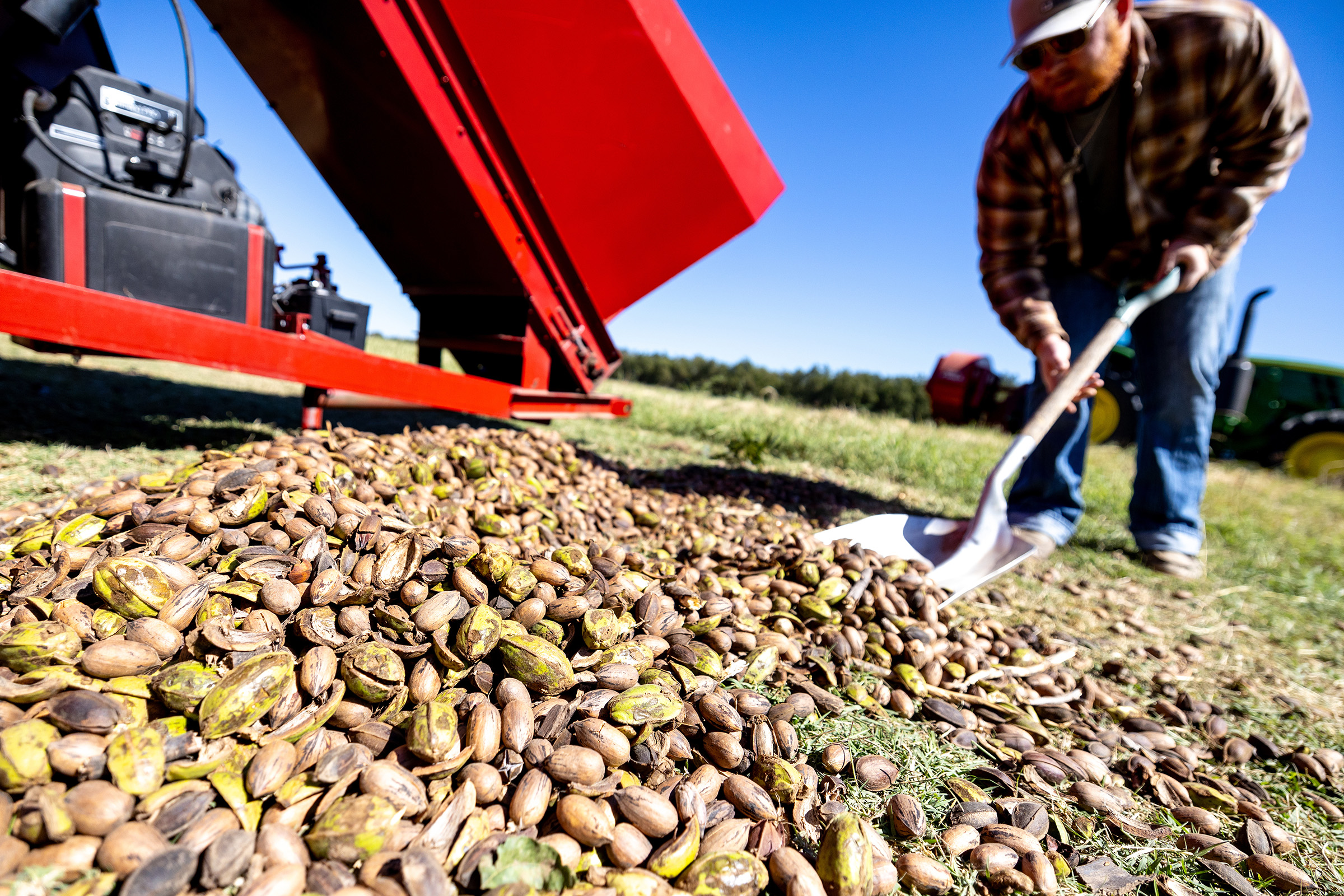Wind storms earlier this year, coupled with a late spring freeze in 2021 and an early fall freeze in 2022, have wreaked havoc on Oklahoma’s pecan crop the past couple of years, but the 2023 outlook is good with harvest on the horizon.
Becky Carroll, Oklahoma State University Extension senior specialist, fruit and pecans, said the National Pecan Shellers Association predicts this year’s crop estimate at 22 million pounds, which is above the average of 17 million pounds in Oklahoma.
“Pecan production is big in Oklahoma. It may not be as big of a commodity as wheat or cattle, but according to the National Agricultural Statistics Service Census of Agriculture, Oklahoma has 1,878 pecan farms that total 96,000 acres of land dedicated to pecan production,” Carroll said. “About 75% of the pecans grown here are native pecans, but the improved varieties are gaining ground due to large new plantings and to urban sprawl where native groves are being replaced by housing and commercial businesses. With the large turnout at the pecan field day recently featuring native pecans, landowners are still interested in learning how to manage our wild, natural production, too.”
Producers have struggled the past couple of years, and some growers are still recovering from the freezes in 2021 and 2022 and recent drought conditions. Carroll said trees tend to shed a lot of pecans before they mature in a drought, and those that do mature are typically smaller.
“If they’re too small, commercial shellers don’t want to purchase them,” she said. “It doesn’t affect the taste, but it takes a lot more pecans to make a pound, which is more work for the shellers.”
Carroll said the pecans were late ripening in 2022 because of the drought, and the early freeze in October took out much of the crop. The pecans froze in the shuck and weren’t viable. In 2021, the late freeze damaged buds growing on the trees.
“Pecans need about 54 inches of water in a season, and we might average 35 inches total in central Oklahoma,” she said. “Last summer’s drought was brutal for producers. Most orchards right now don’t have irrigation, but many people planting new orchards are installing it. Irrigating native groves is not economically feasible.”
The wind storms earlier this year also caused problems for growers because they had to clean up the orchard floor in preparation for harvest.
Susan Haydon Raybourn, a third-generation pecan producer in Okfuskee County, said she is looking forward to a fruitful harvest this year at Haydon Farms. The past two years have been especially challenging for her operation.
“This year we’re recovering from last year’s freeze, and we’ve also been dealing with pecan nut scab,” she said. “Being a native orchard, we tend not to spray as much as they do in the improved variety orchards.”
During the freezes, Raybourn said they had bonfires burning in the orchard, but when it’s that cold for that long, there wasn’t much else she could do to save the crop.
Raybourn’s 600-acre pecan grove is part of a 1,600-acre operation her grandfather, Grover Haydon, started in 1915. Her parents, Paul and Maxine Haydon, made substantial improvements to the farm for 70 years, and she now manages it with her sister. There also are 60 acres dedicated to Stuart pecans that were grafted by her grandfather.
“We will be ecstatic to be gathering a more typical harvest this season,” she said. “Harvest at Haydon Farms will likely continue through mid-January.”
Pecan production is more than a business for Raybourn.
“It’s my heritage,” she said. “The trees have been nurtured by my family for multiple generations, and I get to live in the home my grandparents built and that I grew up in. The fact that I have the opportunity to carry on and do this job is an honor and privilege.”
Josh Grundmann knows something about a family business. He has worked with his parents at Valley View Pecan Company, a business established in 2001, since finishing graduate school at OSU in 2009. He purchased the commercial shelling and candy company located near Shawnee from his parents in 2022.
Valley View Pecan Company is one of two commercial shelling companies in Oklahoma. Grundmann said he shells for 40 to 50 growers and averages about 150,000 to 200,000 pounds of pecans each year. While the average load is 2,000 pounds per producer, the business does shell down to 300 to 500 pounds for small retail stores.
“Being in the shelling and candy business, I didn’t really think about being involved in agriculture until we had a bad crop,” Grundmann said. “With the projection of a good crop this year, I’m looking forward to seeing our customers again and catching up because that means they’re thriving.”
During the past two lean harvest years, he said he had to purchase pecans from out of state to maintain the retail side of his business, which offers a variety of homemade candies along with several kinds of nuts.
“The shelling side of the business is seasonal, but our retail shop is open year round,” he said.
Carroll said Oklahoma is one of the top pecan-producing states, along with Georgia, New Mexico, Texas and Arizona. Carter, Garvin, Ottawa, Bryan and Love counties were Oklahoma’s top-producing counties in the latest ag census.
“Things are looking really good for this year’s harvest, and hopefully our growers will be successful,” she said.


